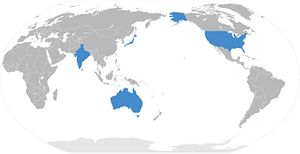In June this year, Japanese Prime Minister Shinzo Abe will have been in office for one-and-a-half years — a rare achievement for a Japanese prime minister in recent memory. Most of his time in office has been devoted to getting Japan’s economic house in order via “Abenomics,” and reinvigorating Japan’s domestic debate about defense issues, including collective self-defense, military spending, and national security strategy. Abe has given considerably less attention to taking the lead on bold international initiatives as he had done as a younger prime minister.
During his first term as prime minister, in 2006-2007, Abe initiated a Quadrilateral Security Dialogue (QSD) between Asia’s maritime democracies: Australia, India, Japan, and the United States. While the QSD drew these powers to the table early on, all concerned by the normative uncertainties posed to the regional order by China’s rise, it later fell apart. In particular, Australian Prime Minister Kevin Rudd pulled Australia out of the QSD because its participation in that dialogue imperiled the trajectory of its relations with China. China, for its part, wasted no time in protesting what it saw as an overt attempt at encirclement.
The QSD has since then attracted little nostalgia among its initial participants. In the United States, it was missed only by a relatively small coterie of neoconservatives. In India, the incumbent Congress-led UPA coalition had other interests in mind vis-a-vis China, leaving a few China hawks interested in the sort of cooperation the QSD promised. For Australia, Rudd’s withdrawal echoes today with Australian security policy that seeks to build trust with China as the two countries continue to deepen their economic relationship.
Abe learned several lessons from his first term in office, but has he completely decided to abandon the vision he put forward in the QSD — that of tandem cooperation between Asia’s democracies against China? While much has changed in Asia since Abe’s first term in office, the general strategic calculus that made the QSD a viable initiative for its participants has not eroded. In fact, if anything, Chinese behavior in recent years should give more urgency to an initiative in the vein of the QSD. If the QSD in 2007 was founded on the hypothesis of a revisionist China, then 2014 is replete with supporting evidence.
So why hasn’t Abe emphasized the necessity for formal multilateral cooperation among Asia’s democracies? One answer is that Abe has come to appreciate the pace and flexibility with which an informal network of strong bilateral partnerships can stand up against international challenges in much the same way that the QSD could. However, where the QSD provided a focused target for Chinese criticism, diffuse bilateral diplomacy serves to obscure this cooperation. Under Abe, Japan’s relations with India, the United States, and Australia remain as strong as ever. Each bilateral relationship forming that quadrilateral also rests on strong foundations (the exception perhaps being U.S.-India ties, which have taken a dip recently). Further, these four countries regularly interact on a military-to-military level and even engage in intelligence sharing.
Additionally, the QSD may no longer be relevant for Japan given that concerns about a rising China have grown more credible domestically. The domestic debate on issues such as collective self-defense and defense spending are beginning to turn in Abe’s favor. Although domestic opposition to constitutional reinterpretation persists in Japan, Abe might not see the utility in formally convening an Asian “concert of democracies” as he did in 2007.
It seems that during his second term, Abe has taken on a preference for internally balancing Japan’s security concerns rather than seeking any sort of external arrangement. The QSD in itself wasn’t Abe’s worst idea for maintaining the status quo in the Asia-Pacific, and may have even been the bud of something akin to an Asian NATO. However, the realities of 2014 both in the region and in Japan may have convinced Abe that the QSD isn’t the best way to pursue that objective anymore.

































